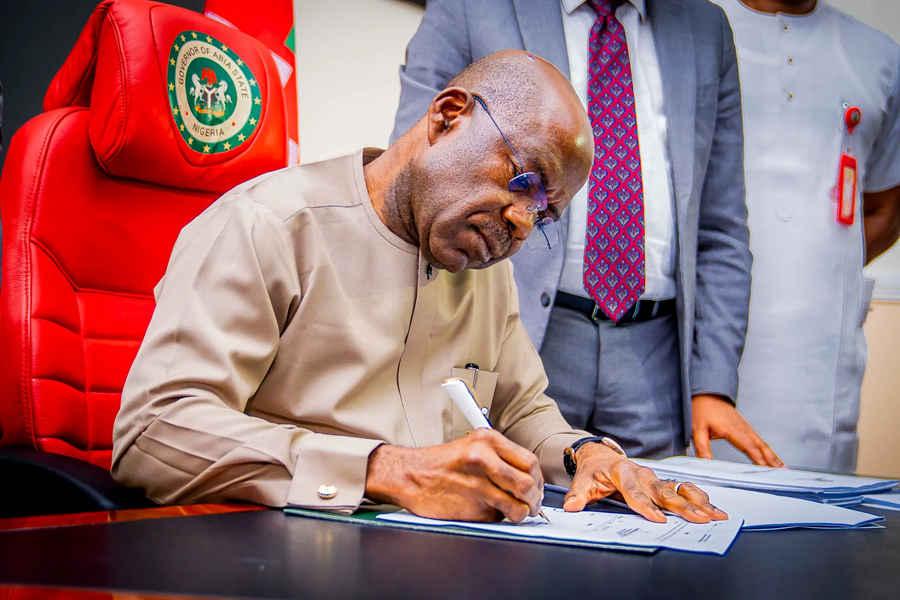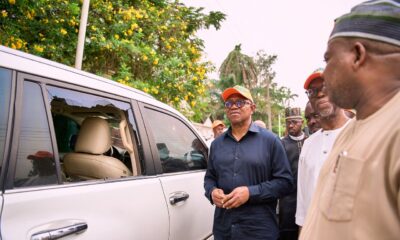Politics
Abia Governor Alex Otti Presents N1.016trn ‘Budget of Acceleration’ for 2026
Governor Alex Otti has presented a record N1.016 trillion budget for 2026, a fiscal plan heavily tilted toward infrastructure, education…

- Governor Alex Otti has presented a record N1.016 trillion budget for 2026, a fiscal plan heavily tilted toward infrastructure, education, and economic reforms as Abia pursues accelerated development and expanded revenue prospects.
Abia State Governor Alex Otti on Tuesday presented a ₦1.016 trillion budget proposal for the 2026 fiscal year, describing it as a strategic roadmap for accelerated growth, infrastructural expansion, and broader economic opportunities.
The appropriation bill, tagged ‘Budget of Acceleration and New Possibilities’, was submitted to Speaker Emmanuel Emereuwa and members of the 8th House of Assembly. Otti said the proposal reflects his administration’s commitment to deepening reforms, strengthening social services, and sustaining the pace of ongoing development projects.

He noted that the 2026 estimate represents a 13% increase over the 2025 budget.
DON’T MISS: Anambra’s 2026 Budget Jumps by 24.1% as Soludo Seeks Approval for ₦757.9bn Spending Plan
Priority on Infrastructure and Capital Projects
According to the governor, ₦811.8bn (80%) of the total budget is dedicated to capital expenditure, while ₦204.4bn (20%) is earmarked for recurrent spending.
Otti emphasized that the 2026 fiscal target is to fund all recurrent costs solely from internally generated revenue (IGR), assuring that external funds—when required—will be deployed strictly for infrastructure.
The state expects to earn:
- ₦83.2bn from FAAC
- ₦67.1bn from VAT
- ₦26.5bn from grants and aid
- ₦168bn from other federal revenue channels
Combined internal and external revenue for 2026 is projected at ₦607.2bn, leaving a deficit of ₦409bn (40% of the budget). The deficit, he said, will be financed through concessionary loans tied to self-liquidating projects.

Massive Investments in Education and Healthcare
The government is allocating ₦203.2bn (20%) to the education sector, including ₦150.4bn for salaries and projects covering about 15,000 teachers. Plans include:
- Construction of 17 model primary and secondary schools
- Establishment of 3 technical colleges
- Development of ICT labs and staff quarters in over 100 public schools
- ₦52.8bn support for tertiary institutions such as ABSU, Ogbonnaya Onu Polytechnic, and Abia State College of Education (Technical)
Healthcare will receive ₦149.7bn (15%), with key projects covering:
- Provision of essential medical equipment for ABSUTH and 23 other facilities
- Reconstruction or renovation of seven general hospitals
- Upgrades to enhance health manpower development
Roads, Transport & Infrastructure Expansion
The state plans to spend ₦169.3bn (16.7%) on roads—construction, rehabilitation, and maintenance. Major routes include:
- Umuahia–Ikot Ekpene Road
- Ahiaeke–Okwuta–Bende Road
- Umuahia–Umueze–Agwu–Mbom Road
- Nkata–Amaeke Road
- Agbo–Umueze Road
- Several community-access roads
For transport, ₦11.1bn has been allocated, including ₦6bn for purchasing 80 additional 40-seater electric buses. The first batch of 20 buses has already been delivered. Funds are also provided for:
- Completion of intermodal transport terminals
- Junction upgrades
- Construction of new bus shelters

Support for Jobs, Entrepreneurs, Youths & Housing
The governor said the budget includes programmes to empower:
- Entrepreneurs and SMEs
- Farmers
- Youths in ICT and sports
- Women and vulnerable households
More than ₦229bn has been earmarked for housing, urban renewal, environmental protection, and cultural development initiatives.
Rising IGR and Improved Fiscal Governance
Otti stated that Abia’s IGR—once around ₦20bn—is projected to reach ₦100bn in 2025 and ₦223.4bn in 2026, driven by improved investor confidence and expanding economic activity.
He added that recent independent assessments rank Abia among the states with the most improved fiscal governance, crediting investments in security, infrastructure, and technology-driven revenue systems.
Otti recalled that traditional rulers, civil society, and youth groups had been consulted earlier to contribute ideas toward shaping the 2026 budget.























